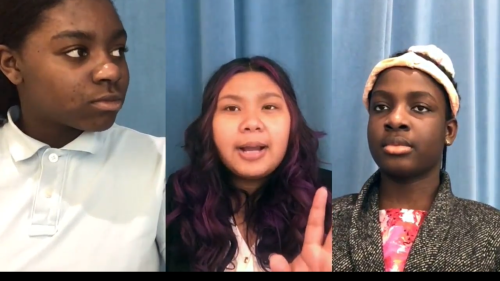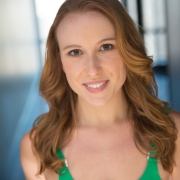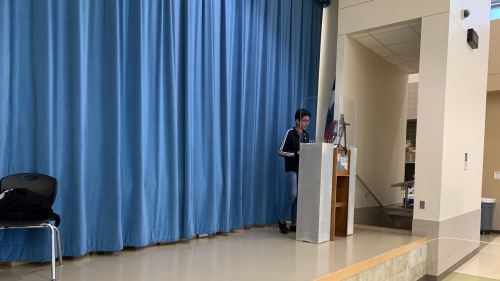
Three students participating in "If You Wanna Switch Seats, We Could."
In a recent restaging of one of the 2020 American presidential election debates, 60 students from across the United States investigated and reenacted word-for-word, mumble-for-mumble, and gesture-for-gesture, a portion of the debate that took place on September 29, 2020, between Donald Trump and Joe Biden.
“Seeing students around the country taking on this text and engaging in respectful and open conversations regarding this very divisive event was inspiring and gave me an immense amount of hope that our future is in incredible hands” says Roxane Reynolds, an alum of the Program in Educational Theatre, whose students in Irving, Texas, participated.
“In addition, I was reminded of the power of theatre to provide a safe space for difficult conversations and to spark real change through the hearts and minds it opens up.”
A native of the Dallas Fort Worth area, Reynolds was interested in teaching in the community in which she grew up after graduating from NYU Steinhardt. She is currently teaching theatre at Lady Bird Johnson Middle School. “I think there is something wonderful about every age group, but middle school is such an incredible time because we can really explore the human development and social emotional learning capabilities of theatre,” Reynolds said in an email interview.
While she was a student at NYU, Reynolds participated in the Verbatim Performance Lab (VPL) through Professor Joe Salvatore’s Ethnodrama course where she was “immediately fascinated and inspired by the power of words to help not only identify, but disrupt bias and intolerance.”
Professor Salvatore reached out to Reynolds to see if her students would be interested in participating in the VPL project entitled “If You Wanna Switch Seats, We Could.”
“I jumped at the chance for my students to be introduced to the work of the VPL and to collaborate with NYU on this project,” she recalls.

This experience gave me more courage as an educator to not shy away from difficult conversations regarding current events in my classroom. I hope to model for our students how we can have these conversations with respect, love, and awareness that we are all carrying biases and assumptions and we can all stand to be a bit more accepting and open.

While it was challenging for Reynolds’ pre-teen students to memorize the text, she worked with them to “code” their scripts for movements and emphasis to make it a bit easier. She and her class talked about the “what” of the debate as well as the “why.” They explored why it is important to do this type of work and how theatre can spark conversations that can counteract intolerance and inspire change. Finally, her class focused on the “how” of the process and the steps of the VPL method, including coaching from Professor Salvatore. “There was great safety within this structure and students felt comfortable sharing their opinions free of judgement. Students began to bring up body shaming, sexism, and ageism, and share their experiences due to this safe space created by VPL,” remarked Reynolds.
“A very impactful moment for my students was during our coaching with Professor Joe Salvatore when he was giving feedback to our all-female version of the debate. In this investigation, there were three young females of color playing the parts of the two candidates and moderator. [Professor Salvatore] encouraged our students to not be afraid to 'take up space' because so often as women we are asked to hide, become smaller, or shy away from the spotlight in a number of ways,” Reynolds recalls.
“During this moment, I saw my students grow taller and gain confidence, because someone who they respected from an incredible university was giving them permission and encouraging them to use their power and use their voices to the highest degree. This is a moment of empowerment that improved their performance, but also allowed them to tap into a personal strength and power that I think young girls are often forced to dull or hide. It was quite extraordinary and a masterclass in coaching and teaching.”
Most of Reynolds’ students had not watched the debate but they did have strong opinions on the candidates and their policies. Reynolds reflected on how engaging her students in the intricacies of the debate helped her explore challenging topics: “This experience gave me more courage as an educator to not shy away from difficult conversations regarding current events in my classroom. I hope to model for our students how we can have these conversations with respect, love, and awareness that we are all carrying biases and assumptions and we can all stand to be a bit more accepting and open.”
Reynolds answered a few questions about her time at NYU and how it prepared her for her work as an educator:
Why did you get your students involved with VPL?
Professor Joe Salvatore was kind enough to reach out to me about “If You Wanna Switch Seats, We Could” and share the initial research questions and focus of the project. I jumped at the chance for my students to be introduced to the work of the VPL and to collaborate with NYU on this project. The 2020-2021 school year was filled with many challenges and instances where our students were not able to participate in projects in a fulfilling way, but this project allowed them to collaborate with a university and be a part of a festival with schools across the country; we had to do it. Furthermore, Joe Salvatore is one of the best and most inspiring educators I have had the privilege to learn from and so I knew this process would benefit my students immensely and make me a better educator.
How has your degree in Educational Theatre helped you?
My degree has helped me in a number of ways. At NYU Steinhardt I articulated and identified my pedagogical philosophy that is the foundation of my classroom, I learned how to plan lessons in accordance with standards and learning goals, I also became part of a network of professors and students that has served me greatly in my work as an educator. Most importantly, I learned the power of a student-led classroom and the importance of co-creating a safe, loving, and accepting classroom environment for students where we can build strong relationships.
Why did you choose to study at Educational Theatre at NYU?
I chose to study Educational Theatre at NYU because I wanted to bring the inspiration and love I had found in theatre to students. Theatre has always pushed me to grow, learn, and expand my imagination in ways I didn’t know were possible. Creating a space for our youth to make critical engagement, empathy, and imaginative solutions habits is something I can contribute to my community My experience at NYU reignited my belief and love for the arts, but also reignited my belief in myself as an agent for positive change and a model for continuous growth and learning. I am grateful everyday for my experience at NYU and feel it is the greatest privilege and honor to be a theatre arts educator. I am in a profession where we foster the growth of empathy, critical thinking, and imagination in our students. What could be more magical?
My experience at NYU reignited my belief and love for the arts, but also reignited my belief in myself as an agent for positive change and a model for continuous growth and learning.
